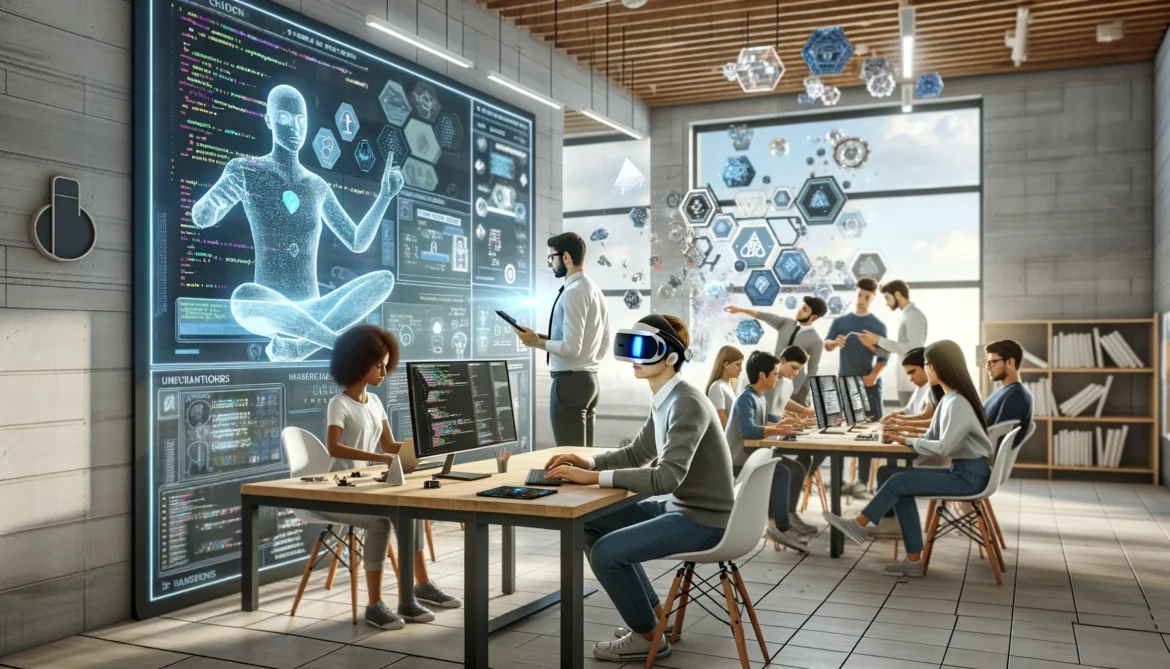Table of Contents
Preparing Students for the Evolving Work and Computer Science Landscape
Computers, the internet, and modern technologies have transformed the work landscape significantly. Artificial intelligence (AI), machine learning (ML), automation, robotics, and blockchain are all disrupting traditional industries and creating new job opportunities. The rapidly evolving digital landscape calls for strategic adjustment of the academic curricula to stay up-to-date with emerging developments. Over the past decade, college curriculum updates have seen more integration of fields focusing on computer science and digital technologies.
For instance, MIT developed an App Inventor to help students learn to code and develop apps. They also released a geometry app that helps with 3D puzzles. Many institutions are also updating their computer science curriculum for the technology future. The goal is to accommodate the pursuit of emerging interests like AI and ML. Fields like cybersecurity, software engineering, data science, IT, and design are already being taught in some schools. Here’s an overview of how colleges prepare students for the evolving computer science landscape.
The Shift in Computer Science Education
Computer science has gone from an elective subject in the K-12 environments to a literacy skill that all students need to prepare for the modern world. With technology creeping into nearly all industries, there’s no evading its impact. Learning institutions are constantly updating their courses to include emerging technologies. Current trends affecting computer science education include artificial intelligence, machine learning, and big data. AI and ML have permeated most industries, leveraging big data and computer processing to emulate human thinking and decision-making and analyze large data sets.
This has led to unprecedented automation and widespread adoption. Nearly every workplace has computers and various appliances that rely on digital technologies. This means colleges must adjust their curricula to reflect the demands of the modern workplace. For instance, an understanding of computer science and data analysis technologies is required for professionals in finance, where developments like decentralized finance (DeFi), cryptocurrencies, and blockchain have changed the landscape.
Traditional CFA analysts focused on high-level investment management requiring basic skill sets encompassing economics, corporate finance, financial reporting, and equity investment strategies. Modern analysts deal with CFA alternative investments involving comprehensive research and analysis of big data from multiple investment companies. The new ecosystem requires advanced computer processing for analysis, forecasting, and strategic risk mitigation. It’s not only the finance sector. All industries, from agriculture to automotive, energy, health, and media, are impacted by emerging digital technologies.
To match this demand, colleges offer interdisciplinary studies and approaches combining computer science with traditional fields. Integrating AI in education is also the new norm, especially with the proliferation of online learning. Students using technology in online learning platforms is common. However, schools are beginning to feature educational games and labs, adaptive learning platforms, individualized support, chatbots, and intelligent tutoring systems. Computer science is no longer an isolated unit. It has seeped into nearly all courses.
Integrating Hands-on Experience
Updating the college curriculum helps to introduce emerging technologies, but students learn more from hands-on experience. The rapid adoption of AI, ML, and other technologies helps provide practical, real-world experiences for students and interns. Over the years, colleges have partnered with companies to provide practical experience through labs, internships, and projects. For instance, MIT partnered with General Electric, which opened a Global Research Center in Boston in 2008.
The University of Oxford also recently partnered with AstraZeneca in 2020 to develop the COVID-19 vaccine. In the tech world, tech giants like Google, Apple, and Microsoft have partnered with dozens of community colleges and universities. Notable partnerships include Google and Northeastern University, Apple and Mesa Community College, and Skyline College. Microsoft also partnered with Bellevue College and the London School of Economics and Political Science.
Tech industry partnerships with schools have offered more students and workers opportunities to complete certification courses for digital technologies like information technology, artificial intelligence, coding, and software development. Coding workshops, boot camps, and courses have also become popular. The workshops offer short-focused courses on code libraries and programming languages. Boot camps provide immersive courses covering skills like software engineering for beginners.
Hackathons and code fests also offer opportunities for collaborative computer programming. Short courses and boot camps are perfect prep for future college students, as they help to introduce the concepts taught in colleges. Tech internships have also become more common and help to provide practical experiences for future workers and innovators. Partnerships between tech industries and learning institutions help to create comprehensive curricula that provide the skills required to offer real-world solutions.
Enhancing Learning with Advanced Technology
Learning tools have evolved from traditional books and presentations to enhanced virtual tools. Technology in education allows students to learn at their own pace while simultaneously freeing up the lecturers, which creates time for them to assist those who need individualized support. Modern colleges use various advanced learning tools and platforms, including cloud computing and virtual reality (VR), to enhance learning.
Colleges also employ modern techniques like elaborative interrogation, self-explanation, practice testing, keyword mnemonic, distributed practice, and more. Modern technology allows colleges to deliver computer science courses and other programs remotely. Students can join online learning platforms, download coursework material, complete virtual labs, and even take monitored exams, leveraging webcams and desktop-locking software.
Learning platforms make education more accessible, eliminating the need to visit physical premises. Students can enjoy flexible schedules and instant access to coursework and study notes regardless of geolocation. Digital simulations and models help to make learning more practical, while emerging technologies like VR create more authentic classroom environments.
Modern colleges can also leverage technologies like gamification, collaborative tools, real-time feedback, augmented reality, and machine learning. Virtual learning is becoming more popular, but technology is also being used in the classroom to enhance learning. Computers, tablets, and smartphones are part of modern colleges and workshops, and VR headsets might be next. AI assistants and AI-personalized learning programs are also predictable in the eLearning industry.
Preparing for Jobs That Don’t Yet Exist
Colleges are tasked with preparing students for jobs that may not exist yet. The evolving technology has created new job categories that weren’t available just a few years ago. Jobs like drone operator, app developer, social media manager, and cloud computing engineer are fairly recent. As technology continues to evolve, colleges will need to teach future-proof skills.
This requires strategies for developing adaptable skills to prepare the workforce for the dynamic future. Colleges today emphasize critical thinking and problem-solving, which are necessary to adjust to emerging changes. More learning institutions are shifting to cutting-edge technical skills, and students are paying more attention to skills-based programs.
Specialized and vocational education programs are replacing career-oriented courses, with students enrolling in soft skills to supplement their technical proficiencies. Soft skills like communication, teamwork, and leadership enhance job adaptability while helping to bridge skill gaps. Higher education is also becoming less linear, with fewer students trying to match degrees with jobs.
Instead, the focus is on understanding real-life problems, finding solutions, and taking action. Some colleges are also partnering with private companies to make the classroom more like the workplace by integrating real-life products. Such partnerships provide insight into future technologies and workforce dynamics, which is critical for job preparation.
Case Studies: Success Stories
A few colleges have managed to successfully prepare students for the evolving tech industry. This can be seen in their success stories and outcomes. Tech employment rates have increased, with students landing lucrative positions in tech companies. The number of successful alumni startups and product launches has also skyrocketed in the last few years as technology seeps into more aspects of modern society.
One of the best case studies is the Massachusetts Institute of Technology, which is known to produce successful entrepreneurs in the tech world. The MIT Entrepreneurship Center provides support and resources to help alumni and students launch their own ventures. MIT alumni have launched some of the most successful tech companies, including Stripe, LinkedIn, Samsara, Okta, Google, Upwork, Ginko Bioworks, FairEye, and Gympass, ResMed.
Another noteworthy success story is the one from The College of Lake County in Illinois. The Lake County manufacturing industry employs nearly 100,000 people, which is almost 15% of the 700,000 residents and generates around $50 billion of the county’s economy. The College of Lake County opened the Advanced Technology Center in 2019 to position itself as a training ground for manufacturing employees trained in the latest technologies.
This is precisely what manufacturing companies sought as the industry went through Industry 4.0, which involved integrating more technology, including automation, robotics, and the Internet of Things (IoT). The Advanced Technology Center facility and curriculum were developed in close consultation with manufacturers and have become a top destination for students looking to enter manufacturing fields with tech knowledge.
Conclusion and Call to Action
Technology continues to permeate more aspects of society, and it’s impossible to foresee any future other than one dominated by digital technologies. The emergence of AI, VR, AR, cryptocurrencies, blockchain, and other recent technologies have forever changed the world and will dictate how the future pans out. For colleges, preparing students for the future is constantly evolving, with computer science taking an immutable role in all disciplines. Interdisciplinary learning, cutting-edge technical skills, vocational education, and partnerships with tech companies dominate the strategies colleges use to prepare students for the changing landscape of computer science.
Tech internships also play an important role in providing students with real-life experiences. Exploring computer science programs focusing on future technologies is the more rational decision for students. More business processes and facets are transferred to the virtual world with each release of new tech. There’s no doubt about the prevalence of technology in the future, given it already dominates most aspects of today’s interactions, production, and service provision.
Author Bio
Cory Shillings, a business visionary, entrepreneur, tutor, and published author, inspires many through his writings, which aim to aid individuals in reaching new heights in their endeavors. His publications provide comprehensive, well-researched, and intuitively organized resources for students, schools, businesses, employees, and boards.









